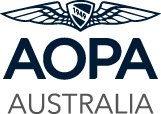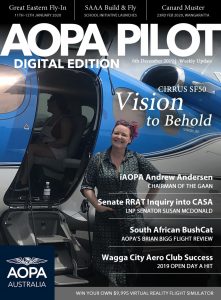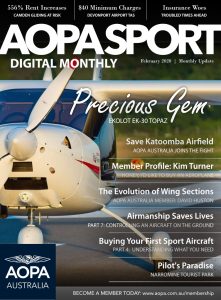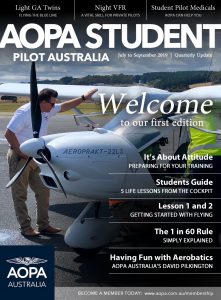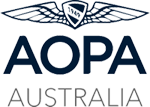AOPA Australia Executive Director Benjamin Morgan speaks with ABC Radio Sydney, regarding allegations raised by the Australian Licensed Aircraft Engineers Association, which were reported to have been leaked by a CASA representative to the Daily Telegraph.
Click to listen to the interview below;
Interview Transcript:
This is a transcript of the ABC Radio Sydney Interview;
ABC Radio Sydney
- A 17 page document has been filed by the Australian Licensed Aircraft Engineers Association to CASA, the Civil Aviation Safety Authority talking about a culture of fear within REX, Regional Express, the airline. Which is Australia’s biggest regional airline that isn’t owned by Qantas, not QantasLink, they’ve got 50 aircraft, 1500 weekly flights, 60 destinations in every state in Australia and if some of these allegations were true, they could be very serious. Ben Morgan is the Executive Director of the Aircraft Owners and Pilots Association; g’day Ben;
Benjamin Morgan
- G’day mate how are you going
ABC Radio Sydney
- Good, what’s the allegation?
Benjamin Morgan
- Well look so far what we have seen released in the media, is a 17 page report from the Australian Licensed Aircraft Engineers Association outlining it’s concerns regarding the culture that has been created by the airline, with respect to the management of engineers. And, the report, again based on what’s been released so-far, the report appears to be outlining that there is a culture of punishing and disciplining engineers who are through the course of undertaking their duties are identifying problems on aircraft. This is a very serious allegation, it’s a very serious report, it’s a report that’s of significant public interest, and so we’ve been calling for the last few days to say this really does need to be made public. And, we need assurances from the Civil Aviation Safety Authority as to whether things are being done properly inside of the airline.
ABC Radio Sydney
- Part of the complaint that was filed on May 27th alleges serious breaches of safety obligations as well as coercion, intimidation and bullying of employees, and the claim is that this has reached a point where employees don’t want to speak up, don’t want to report aircraft defects, including major defects – that’s their words, not mine – major defects for fear of recrimination by the airline. Now what REX says that this is a single disgruntled engineer, they’ve got a press release that I’m holding in my hands saying this is a tabloid beat-up and basically this is an anonymous source accusing REX of having a poor safety culture, but it’s a disgruntled engineer and his union. Is there any truth to that?
Benjamin Morgan
- Well, I don’t necessarily want to get drawn into what REX is saying at this point in time, but I will offer the following statement and that is; We work with the ALAEA on a number of issues and I don’t imagine that the ALAEA have taken the decision lightly to furnish this report. The second thing that is very important for your listeners to understand, is that there is an explicit obligation by any aircraft engineer in this country that works on aircraft, that if they find a concern they are to report it or they are to rectify it. The aircraft engineers working amongst Australia’s airlines, and also right throughout the general aviation industry take their jobs very seriously. Through their responsibilities and work, they keep our aircraft airworthy and in doing so keep aircrews and passengers safe. So it is very important that a culture within an airline or a charter operator or any other organisation that uses aircraft engineers, it’s very important that there by a culture in which those engineers are encouraged to bring issues forward without fear of recrimination. So for the ALAEA to put forward a detailed 17 page report, that outlines there are significant concerns, according to that organisation, with the way in which engineers are being treated is very troubling. And, I would also say this, we are deeply concerned at how the way the Civil Aviation Safety Authority appear to be handling this issue. And, we’ve seen, what’s taken place over this past week, a sincere difference in the way that the airline industry seems to be treated when compared to the smaller general aviation charter industry. Monday to Friday I spend the vast majority of my time representing the smaller general aviation organisations and they tend to find themselves on the receiving end of CASA audits and prosecution for what seems to be an incredibly eager process. CASA are all too willing to hold those smaller businesses to account and to make an example of them, and yet what we are seeing take place through this particular issue, is an unwillingness by the regulator to jump into this issue to make a determination. And, I feel that it really is incumbent on CASA at this point in time, given the magnitude of the allegations, that they do come forward and that they offer some explanation to the Australian public as to the safety status of these allegations and to provide assurances as to if the aircraft are or are not safe in their current form. Until that happens, it’s leaving greater question marks over the whole process.
ABC Radio Sydney
- Well we do have CASA on the line, Peter Gibson, is from the Civil Aviation Safety Authority. Peter thanks for being here, what do you say to the claim that if these allegations had been levelled at a smaller charter operator, that that operator would have been grounded, but because it’s REX they’re not?
Peter Gibson, CASA:
- Ah no, it’s all a matter of evidence and facts. I mean in this case we have a set of allegations, and we’re taking that very very seriously, and like Ben is saying, we need to look at these deeply, carefully, closely, thoroughly and that what we’re doing. But, we are not going to jump to conclusions. If of course, there was evidence, on the face of it, of an immediate safety issue, then we would take immediate action. Just as we did a few months ago when we banned the Boeing 737 MAX from Australian skies. Or a few years ago when we grounded Tiger Airways, if there is an immediate safety we will deal with those. But if there’s not then we’ve got to work through it very carefully and progressively and make decisions based on facts and of course there’s two sides to every story, so we’ve got to get both sides to this and that’s what we’ve been doing. So, no look, the short answer is, we’re treating this the same for an airline as we would a smaller operator and just as we wouldn’t go around publicly discussing all the gory details of our dealings with a smaller air operator we don’t do that with airlines.
ABC Radio Sydney
- So, the Australian Licensed Aircraft Engineers Association, which you just heard Ben refer to in it’s acronym, says that you’ve known about some of these allegations since as long ago as 2016, does it normally take that long to do something about it?
Peter Gibson, CASA:
- Well no, these specific allegations in this document were given to us in late May I think, and we then worked through them ourselves, a couple of weeks after that we said to the union, can we give these to REX to get their side of the story, when they agreed to that we did that, we got REX’s responses back in the last week or so, so we’ve been working through it in a timely and progressive fashion.
ABC Radio Sydney: Josh
- Is the consideration about the disruption that it would cause to regional communities to have REX grounded part of what you have factor in when you consider to ground an airline?
Peter Gibson, CASA:
- Look safety comes first and safety comes second and safety comes third. But, of course naturally you’ve got to make sure that any decisions you take are based on evidence and facts. Everything we do, pretty much, can be taken to the courts and appealed, so if we get it wrong it’s not going to last long anyway cause the courts will overturn it. So, we’ve got to make sure we get it right, and of course naturally when we’re taking big serious decisions, such as grounding an air-operator, grounding an airline, of course we take into account what effects that’s going to have, but that’s after we make the safety decisions.
ABC Radio Sydney
- Yeah, I mean because I think that’s the concern, that people would be worried that basically you don’t want a huge publicity SNAFU and you don’t want to leave communities stranded, so there might be somewhat more leniency in overlooking certain things than it would be if you were looking at a smaller operator that’s more likely to have a lesser impact. I mean there are these occasions where in 2017 there was a REX flight from Albury to Sydney and a 100kg propeller fell off the plane and that landed in southwest Sydney. There was a stalled engine on a Sydney bound REX flight that had to turn back to Griffith, just after takeoff. News Limited has identified a second source, so they’re not just relying on the Australian Licensed Aircraft Engineers Association document that has been submitted to you guys at CASA, but also a second source who is familiar with this investigation who’s calls the culture at REX manifestly dangerous and who says people won’t report the stuff, I won’t fly REX, I’ll either go QantasLink or I’ll walk.
Peter Gibson, CASA:
- Oh look that culture is absolutely important as Ben says, it’s central to safety in any aviation organisation, large or small, if you don’t have a good culture behind safety, then everything else really falls apart. You can have the best spare parts, you can have the best personnel, but if everyone is not committed to putting safety first you end up getting problems. So, we spend a lot of time and effort educating and training people on all of that, and we also spend a lot of time and effort when we’re doing our safety surveillance and audits and our checks focussing on those things, safety management systems, safety culture etc, so yeah that is a huge focus and if it’s bought into question, then naturally we take it very very seriously. That’s why we’re taking these allegations very very seriously. But it doesn’t mean we jump in and take knee jerk action, it means we dig deep and get to the bottom of it, understand what the basis of the allegation are, if there a problems, how do we deal with those, what are the best solutions, so that we come out the other end confident that we’re going to have the best possible safety standards in place.
ABC Radio Sydney
- How long does that process take, cause in the meantime there are lots of people getting on lots of REX aircraft and flying through a lot of airspace.
Peter Gibson, CASA:
- Sure and that’s understandable that they could be nervous and we’ve got to say to them; look we cant give you a specific answer and say we’re going to have all this wrapped up by next Tuesday, because we just don’t know. We are still working through it, we’ve got lots of options as to what our next steps are. We can obviously sit down with REX, put more questions to them, we can go through their maintenance documentation, we can go into their workshops, and look at those, we’ve got all sorts of options for things we can do if we so choose. We’ve got to decide what we do next, and then evaluate all that evidence. But, I think what passengers should be very clear about is, if we come across something today or tomorrow, which gives us an immediate concern for safety, we will take action up to and including grounding any air-operator large or small.
ABC Radio Sydney
- Peter good to talk to you, thanks for filling us in.
Peter Gibson, CASA:
- Thank you
ABC Radio Sydney
- That’s Peter Gibson from the Civil Aviation Safety Authority about these allegations against REX, Ben Morgan meanwhile is the Executive Director of the Aircraft Owners and Pilots Association, Ben is that satisfactory?
Benjamin Morgan
- Look I think I won’t criticise Peter to hard, other than to say that there are a couple of key points that what CASA don’t know at this point is exactly what they don’t know and that they key in this, is that they have in fact been handed a report that has in it a very serious safety allegation, in that we have engineers who are being reprimanded for finding significant issues, according to the ALAEA, significant issues with corrosion on propeller shafts and you just heard CASA say right there and then that they don’t know. And, it’s unknown at this point and time , and I think that this is an astounding that, it’s unknown if they’ve actually gone and sighted these aircraft, now I know I said three days ago that it’s incumbent on CASA to go out and actually physically have a look at those aircraft and make a determination as to whether there is or is not a problem. I think it’s alarming that Peter’s there saying, that basically, CASA’S taking it’s time and it’s working through it. Because what we know is a fact, is that they do not behave this way when it comes to smaller operators, and we only just last year reminded through the grounding of a small jet charter operator out of Sydney, who was conducting aeromedical operations, that this is a regulator that has a proven track record and a proven history of jumping to allegations, immediately moving to ground an operation causing significant disruption to those operators and then working through the problem, with the comfort of knowing the operator is on the ground until they can resolve it. So Peter is not being entirely consistent or entirely honest with his statements, because CASA’s own track record of the last 25 years is a different story.
ABC Radio Sydney
- Peter, I am happy to give you a right of reply if you’re still there.
Peter Gibson, CASA:
- Yeah well look I think that Tiger Airways might have something to say about that, they were on the ground for a number of weeks because of actions we took because we weren’t satisfied with their safety standards. And, other airlines going back into history as well. So look, we take action based on evidence, basically it doesn’t matter if you are small or big, if the evidence is there that there is an immediate safety problem, safety issue, that’s going to put people at risk then we put you on the ground. If there’s not, then we work methodically through the information and the evidence and come up with the answers to deal with the problems, and sometimes that takes a little time. But as I say, if we need to act we will act and we certainly show no fear or favour for large operators or small operators. Everybody is treated on the basis of the evidence before us.
ABC Radio Sydney
- Peter and Ben thanks for being with us.
